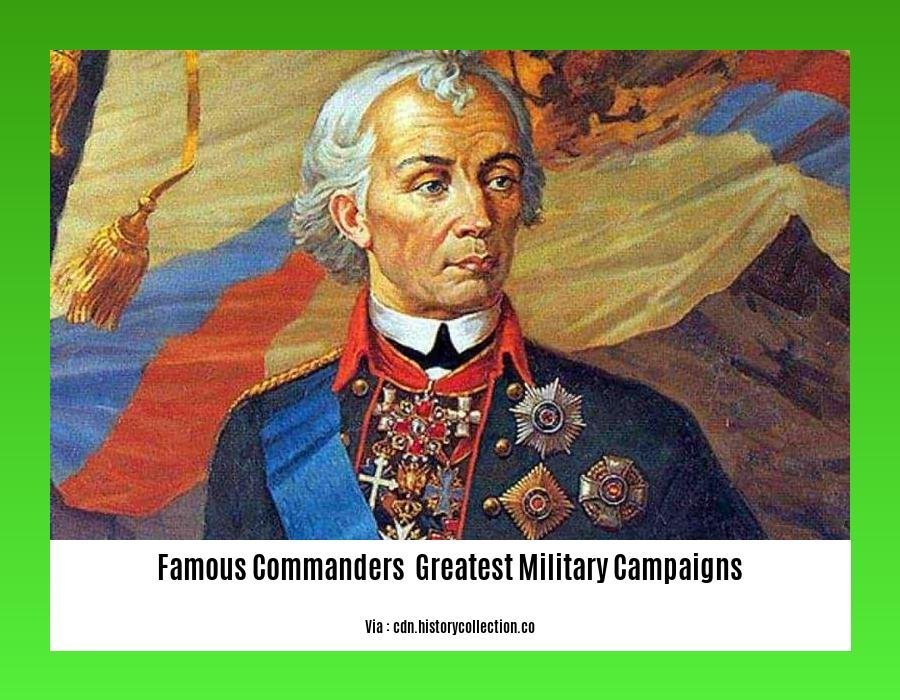Prepare to embark on a captivating journey through the annals of history’s most renowned military campaigns in Famous Commanders’ Greatest Military Campaigns. We will delve into the brilliant minds and strategies that led legendary commanders to triumph, uncovering the secrets of their success and the timeless principles of warfare. From ancient battles to modern conflicts, this exploration will illuminate the complexities and nuances of military strategy, leadership, and the human spirit in the face of adversity.
Key Takeaways:

- Alexander the Great conquered vast territories with a small, skilled army.
- Hannibal’s audacious crossing of the Alps and invasion of Italy remain remarkable military feats.
- Napoleon’s La Grande Armee achieved significant victories in the Campaign of 1805.
- The Mongolian Conquest of Asia had a profound and lasting impact on history.
Famous Commanders’ Greatest Military Campaigns
History chronicles their names, etched in the annals of warfare: Alexander the Great, Julius Caesar, Hannibal, Genghis Khan, and Napoleon Bonaparte. These famous commanders’ greatest military campaigns stand as testaments to their strategic brilliance, tactical prowess, and indomitable spirit.
Alexander the Great: Conquering the Known World
From the shores of Greece to the Indus River, Alexander the Great led his army on an unprecedented expedition that spanned continents. With lightning-fast movements and innovative tactics, he toppled the mighty Persian Empire and forged a vast empire stretching from the Mediterranean Sea to the borders of India. His legacy endures, a testament to his unmatched military prowess.
Julius Caesar: Subjugating Gaul and Shaping Rome’s Destiny
Caesar’s campaigns in Gaul were a masterpiece of military strategy. With a mix of diplomacy, cunning, and brute force, he conquered and pacified a sprawling territory, adding it to Rome’s growing empire. His military exploits not only expanded Rome’s borders but also cemented his reputation as one of history’s greatest generals.
Hannibal: Crossing the Alps and Invading Italy
Hannibal’s audacious invasion of Italy from Spain is a tale of military brilliance and strategic audacity. With a daring maneuver, he led his army across the treacherous Alps, catching the Romans by surprise. His use of elephants and guerrilla warfare proved formidable, even against the might of the Roman legions.
Genghis Khan: Sweeping across Asia
Genghis Khan’s Mongol horde swept across Asia like a whirlwind, conquering vast territories from China to Eastern Europe. His exceptional leadership, adaptability, and military innovations allowed him to forge one of the largest empires in history. His conquests shaped the course of Asian history, leaving an enduring legacy.
Napoleon Bonaparte: Revolutionizing Warfare in Europe
Napoleon’s military campaigns in Europe redefined the art of warfare. His lightning-fast movements, use of artillery, and unparalleled strategy shattered armies and conquered nations. His campaigns reshaped the political landscape of Europe, leaving an imprint on military tactics that would endure for centuries.
Read about legendary military commanders who changed the course of history with their brilliant strategies and triumphs in battle. Dive into the fascinating lives of renowned commanders and their seminal conflicts, exploring their impact on the art of warfare. Discover the iconic military leaders whose landmark battles shaped the course of nations and left an indelible mark on history.
Hannibal: Invasion of Italy from Spain
One of the most renowned military commanders of all time, Hannibal Barca, staged a daring invasion of Italy from Spain, crossing the treacherous Alps in a remarkable feat of strategy and endurance. His invasion sparked the Second Punic War, shaping the course of Mediterranean history.
Background
Hannibal’s invasion was motivated by his desire to avenge his father’s defeat in the First Punic War and Carthage’s subsequent loss of territory. He spent years assembling an army in Spain, gathering experienced Carthaginian veterans, Spanish warriors, and even elephants.
The Journey from Spain
In 218 BC, Hannibal embarked on his invasion, leading his army across the Pyrenees and into southern Gaul. He avoided Roman forces and skillfully negotiated with local tribes, securing their support.
Crossing the Alps
The most challenging part of Hannibal’s journey was crossing the Alps. His army faced treacherous terrain, snowstorms, and fierce resistance from mountain tribes. Elephants were reportedly used to transport supplies and clear paths, but the crossing took a heavy toll on the Carthaginian army.
Arrival in Italy
Despite the hardships, Hannibal and his forces reached Italy in 217 BC. They quickly gained victories over Roman armies, employing innovative tactics and the strategic use of elephants on the battlefield. The Battle of Cannae in 216 BC stands as one of Hannibal’s greatest triumphs, virtually annihilating a Roman army twice the size of his own.
Key Takeaways:
- Hannibal’s invasion was a daring and innovative military campaign.
- He skillfully utilized Spain as a base of operations, assembling a formidable army.
- The crossing of the Alps was a remarkable feat of endurance and strategy.
- Hannibal’s tactical brilliance and the use of elephants on the battlefield led to several victories over Roman forces.
Genghis Khan: Sweeping Conquests across Asia
In the annals of warfare, few figures tower as majestically as Genghis Khan. His military campaigns, spanning vast tracts of Asia, stand as a testament to his exceptional leadership, adaptability, and military prowess. “The man who shook the world” – as he was aptly called – was not just a conqueror but a visionary who transformed the very landscape of warfare.
Key Takeaways:
- Unprecedented Leadership: Genghis Khan possessed an unparalleled ability to inspire and command loyalty, forging a formidable army out of nomadic tribes.
- Strategic Brilliance: He employed innovative tactics, such as feigned retreats, flanking maneuvers, and psychological warfare, to outwit and overwhelm his adversaries.
- Adaptability and Innovation: Genghis Khan’s army adapted to diverse terrains and climatic conditions, using advanced weaponry and siege tactics to overcome challenges.
- Merciless Efficiency: While brutal in his conquests, Genghis Khan displayed a pragmatic approach, often sparing skilled workers and integrating them into his empire.
- Legacy of Conquest: His campaigns resulted in the establishment of a vast Mongol Empire, stretching from the Pacific to the Caspian Sea, forever altering the geopolitical map of Asia.
Genghis Khan: Military Genius and Mongol Empire’s Architect
Napoleon Bonaparte: Campaigns in Europe
Let’s delve into the strategic brilliance of Napoleon Bonaparte, the master of maneuver warfare. His campaigns in Europe left an indelible mark on history, showcasing his lightning-fast movements, masterful use of artillery, and unparalleled military strategy.
Rise to Prominence
Napoleon’s early victories in Italy cemented his reputation as a brilliant commander. At the Siege of Toulon, he demonstrated his artillery prowess, capturing the city from British and Royalist forces. He followed this triumph with a series of decisive victories at Saorgio, Dego, and 13 Vendémiaire, restoring stability to Revolutionary France.
Conquering Italy
Napoleon’s Italian campaign is widely regarded as one of his greatest feats. He deftly outmaneuvered the Austrian and Piedmontese armies, crossing the Alps in a daring move that surprised his enemies. His lightning-fast strikes and decisive battles led to the conquest of Northern Italy and the establishment of the Cisalpine Republic.
Campaigns in Central Europe
After his Italian triumph, Napoleon turned his sights on Central Europe. He defeated the Austrians in the Battle of Arcole and the Prussians in the Battle of Jena-Auerstedt. His audacious march on Vienna forced the Austrians to negotiate the Treaty of Pressburg, which gave France control over much of Central Europe.
Key Takeaways:
- Napoleon’s use of artillery was instrumental in his victories.
- His lightning-fast movements and strategic maneuverability overwhelmed opponents.
- He was adept at adapting his tactics to different battlefields and enemies.
- Napoleon’s leadership and inspiration motivated his troops to achieve extraordinary feats.
Relevant URL Source:

FAQ
Q1: What were the key factors that contributed to Genghis Khan’s military success?
Q2: How did Napoleon’s military tactics and strategies differ from those of his contemporaries?
Q3: What was the significance of Alexander the Great’s conquest of the Known World?
Q4: In what ways was Hannibal’s invasion of Italy a remarkable achievement?
Q5: How did the Mongolian Conquest of Asia impact the course of world history?
- Unlock 6000+ words beginning with he: A comprehensive analysis - April 20, 2025
- Mastering -al Words: A Complete Guide - April 20, 2025
- Master Scrabble: High-Scoring BAR Words Now - April 20, 2025
















